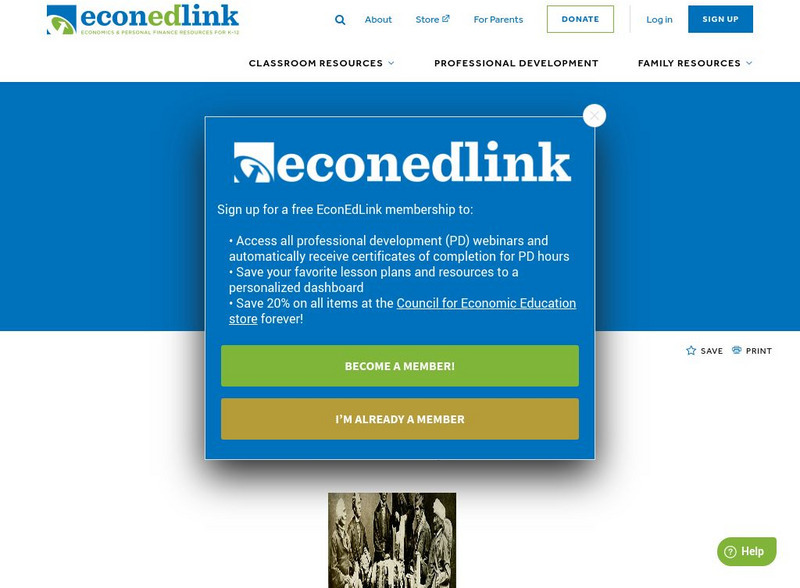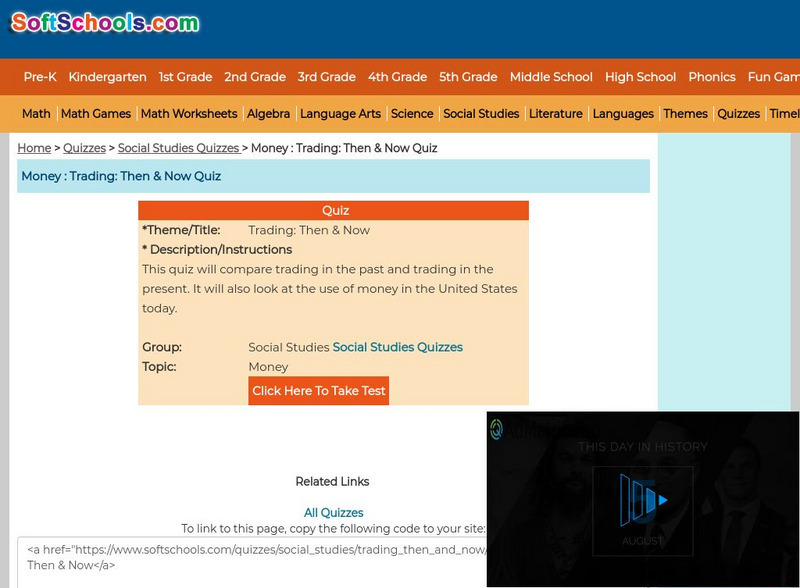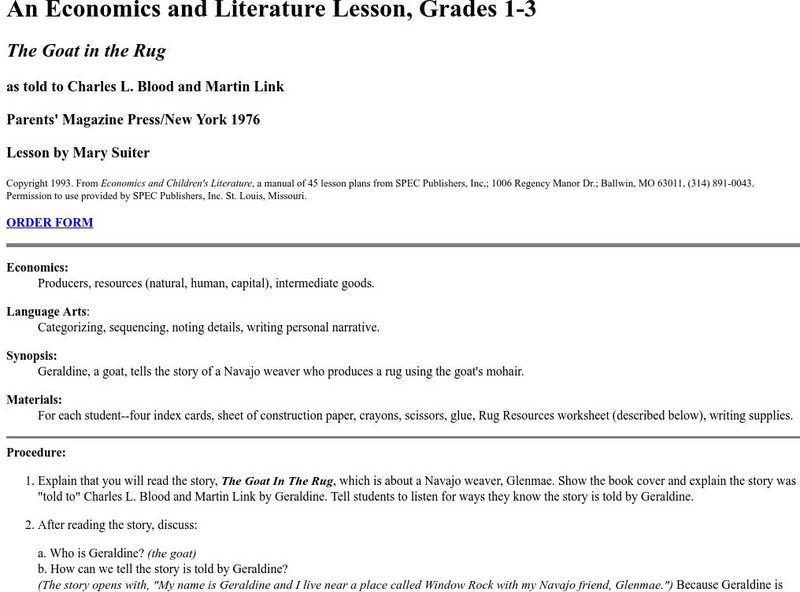Council for Economic Education
Econ Ed Link: To Buy or Not to Buy
While precise numbers are not known, it is believed the number of boycotts has grown markedly in the past fifty years. Consumers seem to be besieged by requests from special interest groups to refrain from buying certain goods and...
Council for Economic Education
Econ Ed Link: We Are Consumers and Producers
This lesson plan is geared toward beginning economics concepts. "In this lesson you are going to learn more about how you and others are consumers and producers."
Council for Economic Education
Econ Ed Link: The Trading Game
For this lesson, students will learn about the gains from trade. Students will participate in a trading game that will demonstrate that trade can make everyone better off.
Texas Education Agency
Texas Gateway: Chapter I: Welcome to Economics!: Key Terms
This is a list of economics key terms and definitions used in Chapter I: Welcome to Economics! of the TEA AP Macroeconomics online text.
Auburn University
Auburn University: A Glossary of Political Economy Terms: Public Goods Defined
This site is an excellent explanation of the economic concept of public goods. The Auburn University site is part of a dictionary of political economic terms.
Council for Economic Education
Econ Ed Link: I Have No Money, Would You Take a Wampum?
This site teaches students about traditional economies and how exchanges of goods and services were made before money. Students learn about a bater economy which predates our traditional economy.
Council for Economic Education
Econ Ed Link: Peanuts, Pecans, and Peas, Please (Lesson)
Check out this informative site that looks at the world of the peanut. This tiny nut had a great influence on our economy. Find out how George Washington Carver changed the economy of the South with his research on the lowly peanut.
Practical Money Skills
Practical Money Skills: Market Economy
In a market economy, the principles of supply and demand determine what is produced, how it is produced, and by whom it is produced and consumed. Learn how planned economies and mixed economies differ.
Scholastic
Scholastic: Adventures in Math: Lesson 1: Money Basics
Why do we use money? Learn why we need money and to identify bills and coins.
Alabama Learning Exchange
Alex: Writing Roulette: Walmart Sells Everything!!!
As a part of the study of Economics, the students will cooperatively write an essay using terms associated with the basics of economics. In cooperative learning groups of four students will use a word list and prior knowledge to...
Practical Money Skills
Practical Money Skills: Gross Domestic Product
Learn about the Gross Domestic Product(GDP),the sum total of the market price of all the final goods and services produced within a country's borders during a given period of time.In the U. S. it's measured in quarters of a year, then...
Practical Money Skills
Practical Money Skills: Consumer Price Index
Consumer Price Index or cost-of-living index is a measure of the change in price that an average consumer pays for a pre-defined "market basket" of goods and services. It is one of the key measurements of inflation.
Federal Reserve Bank
Federal Reserve Bank of Atlanta: Circular Flow
Explains how resources, goods and services, and payments flow through the economy using the economic model of circular flow.
University of Nebraska Omaha
University of Omaha: Lesson Plan: Why Do I Want All This Stuff? [Pdf]
This lesson plan addresses consumer demand and advertising. Indicated for grades 3 through 5.
IQ Site
Iq Study Activities: Interactive Quizzes: Economics
Fifteen-question multiple-choice exercise is immediately scored and checks your understanding of economics.
Soft Schools
Soft Schools: Trading: Then & Now
This quiz will compare trading in the past and trading in the present. It will also look at the use of money in the United States today.
University of Nebraska Omaha
An Economics and Literature Lesson: The Goat in the Rug
This is a lesson plan geared toward first through third grades, cross-curricular, dealing with economics and literature. "Learn about economics: producers, resources (natural, human, capital), intermediate goods; and Language Arts:...
University of Nebraska Omaha
Ec Ed Web: If You Give a Mouse a Cookie
This lesson plan is cross-curricular, economics and literature. Using the book "If You Give a Mouse a Cookie," students will understand cause and effect and unlimited want, goods and services.
SMART Technologies
Smart: Goods and Services
This activity helps K-2 students explore and understand the goods and services that are in their community.
University of Nebraska Omaha
Ec Ed Web: The Doughnuts
An economics and literature lesson addressing capital resources, increasing productivity, and research skills. Based on a story by Robert McClosky called The Doughnuts.












